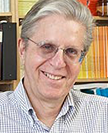Four Pitt Professors Named Fellows by the American Association for the Advancement of Science
Four University of Pittsburgh professors have been named Fellows of the American Association for the Advancement of Science (AAAS) for the contributions they have made toward the advancement of their respective fields. Joining the 2012 class from Pitt are Bruce Freeman, pprofessor and chair in the School of Medicine’s Department of Pharmacology and Chemical Biology; Peyman Givi, Peyman Givi, James T. MacLeod Professor of Engineering in the Swanson School of Engineering’s Department of Mechanical Engineering and Materials Science; Valerian Kagan, professor and vice chair in the Graduate School of Public Health’s (GSPH) Department of Environmental and Occupational Health; and Allan Sampson, professor of statistics in the Kenneth P. Dietrich School of Arts and Sciences with a joint appointment in the GSPH Department of Biostatistics.
The four Pitt faculty honorees are among 702 Fellows selected this year, joining faculty from such other elite institutions of higher education as Harvard, Johns Hopkins, and Princeton. The Fellows will be honored Feb. 16 during the annual AAAS meeting in Boston, Mass.
Information on the new Fellows from Pitt follows.
Bruce A. Freeman was honored for his distinguished contributions to the field of free radical biology and the regulation of cell function.
Freeman’s research focuses on the biochemical links between oxygen radicals—such as superoxide, hydrogen peroxide, and nitric oxide (NO)—and NO-dependent cell signaling, as well as how those interactions influence cell and organ function. His team pioneered the notion that NO, which plays critical roles in inflammation and cell regulation, displays unique signaling actions following a reaction with superoxide, oxidizing fatty acids, and heme peroxidases.
signaling, as well as how those interactions influence cell and organ function. His team pioneered the notion that NO, which plays critical roles in inflammation and cell regulation, displays unique signaling actions following a reaction with superoxide, oxidizing fatty acids, and heme peroxidases.
Freeman has published more than 200 papers in peer-reviewed journals and written 61 book chapters and invited review articles. In 2003, he was named one of the 100 most highly cited authors in biology and biochemistry. He was an invited speaker at the Nobel Conference in 2004—the same year he received an honorary doctorate from the Universidad de la Republica in Montevideo, Uruguay, where he had been a Fulbright Scholar in 1993.
Freeman was president of the Society for Free Radical Biology and Medicine in 2004 and has been awarded several patents related to novel anti-inflammatory therapeutic strategies. He has served on peer-review committees and study sections for the National Science Foundation, the National Institutes of Health (NIH), and many other agencies, and he also has served on numerous editorial and advisory boards. In addition to receiving grants from the NIH’s National Heart, Lung and Blood Institute, he has been funded by NASA and the Jet Propulsion Laboratory for a project focused on defining soil-based radicals and oxidants as part of the ongoing robotic missions to Mars.
Freeman received his Bachelor of Science degree in 1974 and his doctorate in biochemistry in 1978, both from the University of California, Riverside, and conducted postdoctoral and junior faculty research at Duke University School of Medicine.
Peyman Givi, who holds a secondary appointment in chemical and petroleum engineering, was honored for his pioneering contributions in computational combustion, for teaching the next generation of engineers, and for his dedicated efforts to the engineering profession.
Givi’s areas of research interest include turbulence, combustion, thermal fluids, computational methods, and stochastic (random) processes. His research aims to create more fuel-efficient engine designs, which he works on by simulating turbulent combustion using Pitt’s Center for Simulation and Modeling and the Pittsburgh Supercomputing Center.
create more fuel-efficient engine designs, which he works on by simulating turbulent combustion using Pitt’s Center for Simulation and Modeling and the Pittsburgh Supercomputing Center.
Givi serves as the deputy editor and book review editor of AIAA Journal and is a member of the editorial boards of Computers & Fluids, the Journal of Applied Fluid Mechanics, and the Open Aerospace Engineering Journal. He also is an associate editor of the Journal of Combustion and a past advisory member of Progress in Energy and Combustion Science.
Givi was among the first 15 engineering faculty members nationwide to receive the Presidential Faculty Fellowship from former President George H.W. Bush. Givi also received the Young Investigator Award from the Office of Naval Research and the Presidential Young Investigator Award from the National Science Foundation. In 2007, he was named “Engineer of the Year in Pittsburgh” by the American Society of Mechanical Engineers. In 2005, he was awarded the NASA Public Service Medal for his contributions in high-speed propulsion.
Givi earned his undergraduate degree in engineering from Youngstown State University in 1980 and his PhD in mechanical engineering from Carnegie Mellon University in 1984.
Valerian Kagan was honored for his distinguished contributions to the fields of free radical biology, medicine, and programmed cell death.
Kagan is also the director of Pitt’s Center for Free Radical and Antioxidant Health, as well a professor of pharmacology and chemical biology, radiation oncology, and chemistry at Pitt. In addition, he holds appointments as a foreign professor at the Karolinska Institute in Stockholm, Taipei Medical University in Taiwan, and, in Moscow, Russian State Medical University and Lomonosov Moscow State University.
chemistry at Pitt. In addition, he holds appointments as a foreign professor at the Karolinska Institute in Stockholm, Taipei Medical University in Taiwan, and, in Moscow, Russian State Medical University and Lomonosov Moscow State University.
Kagan’s research is focused on molecular mechanisms of oxidative stress, antioxidants, tissue and cell acute and chronic injury, and molecular and nanotoxicology. He is one of the pioneers of a new field of research surrounding oxidative lipidomics—the study of lipids and their oxidation. He has had more than 500 peer-reviewed papers published on these subjects.
Kagan serves as an executive editor of Antioxidants and Redox Signaling and an associate editor of Chemistry and Physics of Lipids. He is a member of the editorial boards of Biochimica et Biophysica Acta, Biomembranes, and Nanomedicine: Nanotechnology, Biology and Medicine.
Kagan graduated from Lomonosov Moscow State University with degrees in biochemistry and biophysics. He earned a PhD in biochemistry and biophysics from Moscow State University in 1972, and, in 1981, he was awarded a Doctor of Science degree from the USSR Academy of Sciences.
Allan R. Sampson, professor of statistics in the Kenneth P. Dietrich School of Arts and Sciences, was honored for his distinguished contributions to statistical methodology, advancing innovative statistical techniques in neuroscience and clinical trials, and fostering the studying and teaching of statistics at the University of Pittsburgh. Sampson has a joint appointment with Pitt’s Department of Biostatistics in the Graduate School of Public Health. Sampson’s statistical research areas include multivariate analysis, clinical trial designs, order-restricted inference, and meta-analysis. His interests include applications of statistics to psychiatry, medicine, and drug development. He has coedited two books and has had nearly 150 papers published in various statistical, neuroscience, and psychiatry peer-reviewed professional journals.
Pittsburgh. Sampson has a joint appointment with Pitt’s Department of Biostatistics in the Graduate School of Public Health. Sampson’s statistical research areas include multivariate analysis, clinical trial designs, order-restricted inference, and meta-analysis. His interests include applications of statistics to psychiatry, medicine, and drug development. He has coedited two books and has had nearly 150 papers published in various statistical, neuroscience, and psychiatry peer-reviewed professional journals.
Sampson is an associate editor of Methodology and Computing in Applied Probability. Previously, he previously served as an associate editor of the Journal of the American Statistical Association and a member of the editorial board of the Journal of Multivariate Analysis. Sampson also has served on a number of U.S. Food and Drug Administration advisory committees.
Sampson is a Fellow of the American Statistical Association, a Fellow of the Institute of Mathematical Statistics, and an elected member of the International Statistics Institute. In 1992, he was named “Statistician of the Year in Pittsburgh” by the Pittsburgh Chapter of the American Statistical Association.
Sampson earned his Bachelor of Science degree in mathematics from UCLA (1966) and his Master of Science (1968) and PhD degrees (1970) in statistics, both from Stanford University.
The American Association for the Advancement of Science is the world’s largest general scientific society and publisher of the journal Science as well as Science Translational Medicine and Science Signaling. AAAS was founded in 1848 and includes 262 affiliated societies and academies of science serving 10 million individuals. The mission of the nonprofit AAAS is to “advance science and serve society” through initiatives in science policy, international programs, and science education, among other areas.
Other Stories From This Issue
On the Freedom Road

Follow a group of Pitt students on the Returning to the Roots of Civil Rights bus tour, a nine-day, 2,300-mile journey crisscrossing five states.
Day 1: The Awakening
Day 2: Deep Impressions
Day 3: Music, Montgomery, and More
Day 4: Looking Back, Looking Forward
Day 5: Learning to Remember
Day 6: The Mountaintop
Day 7: Slavery and Beyond
Day 8: Lessons to Bring Home
Day 9: Final Lessons

